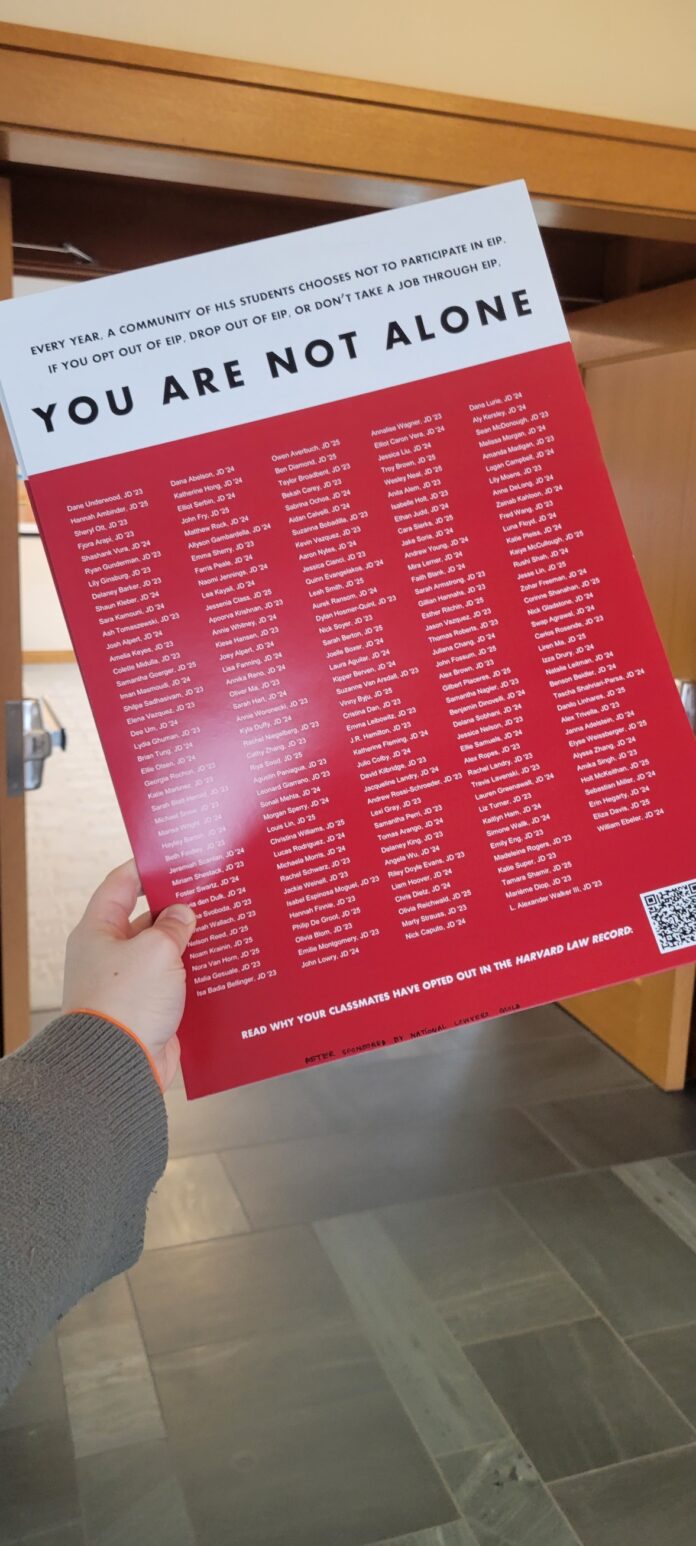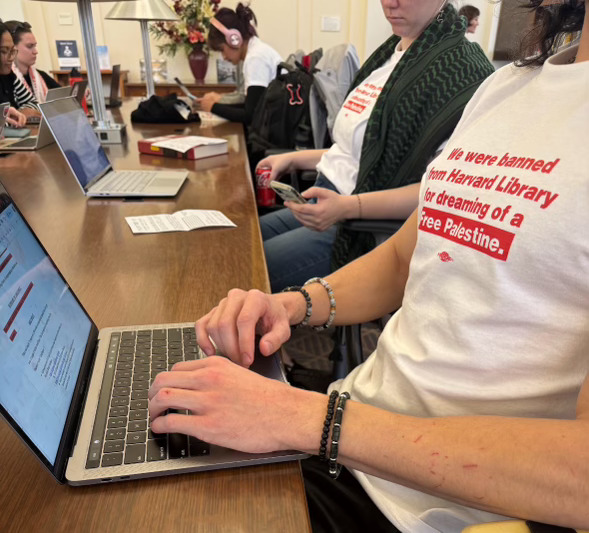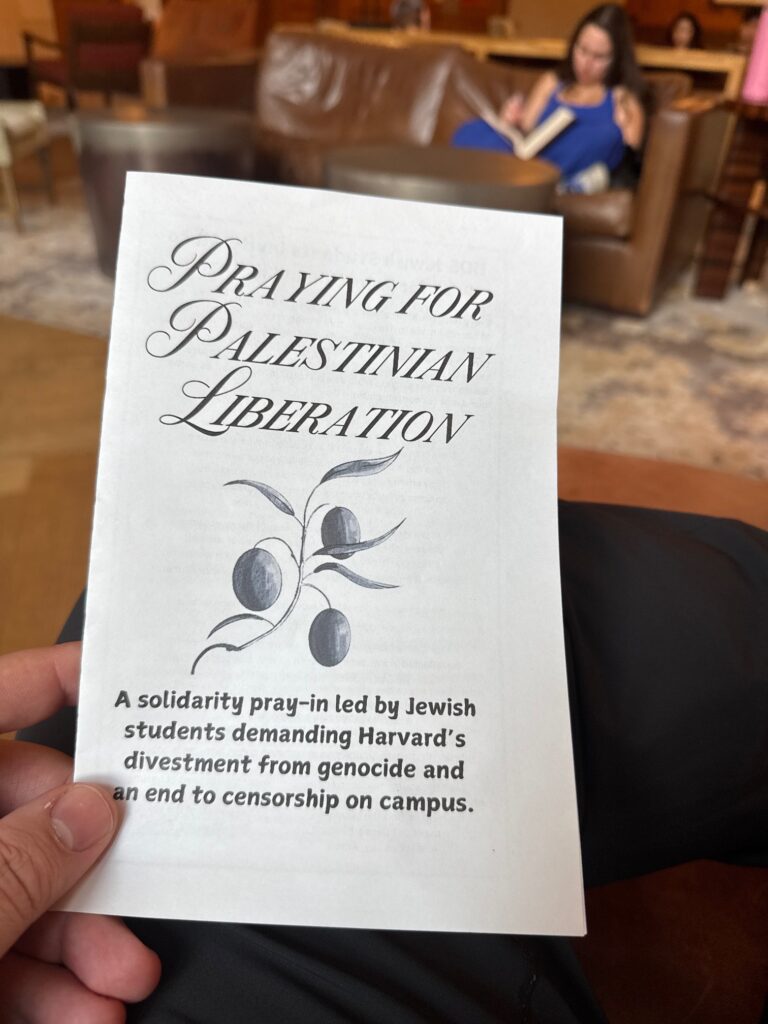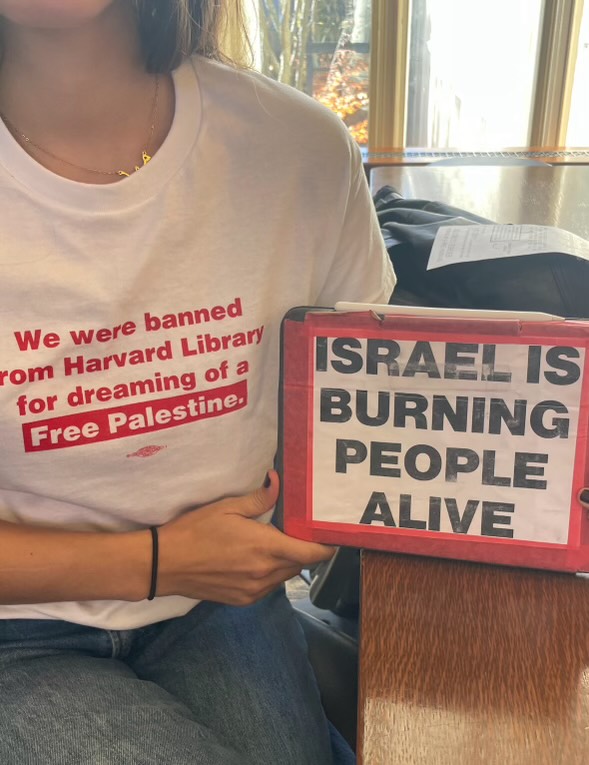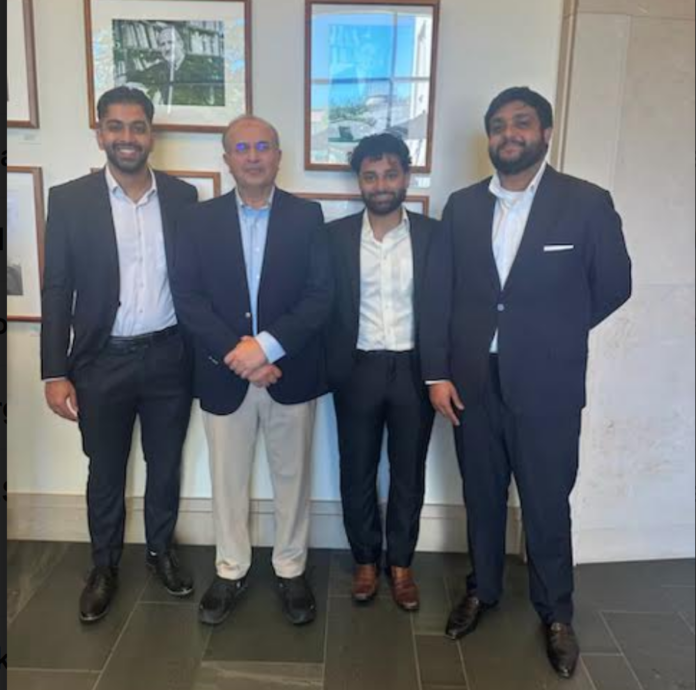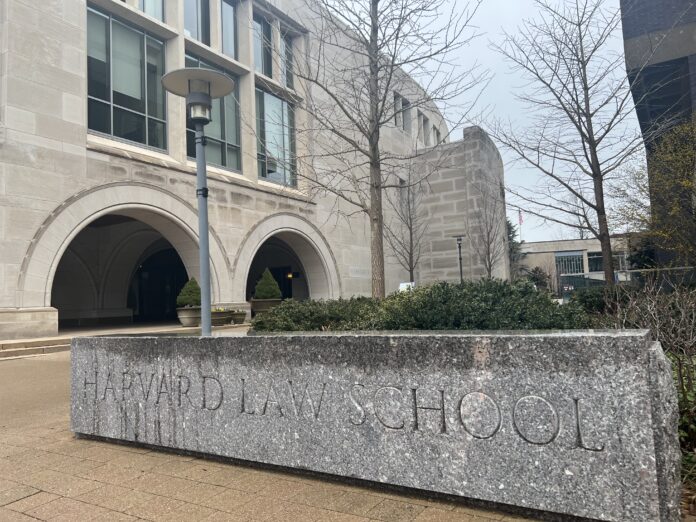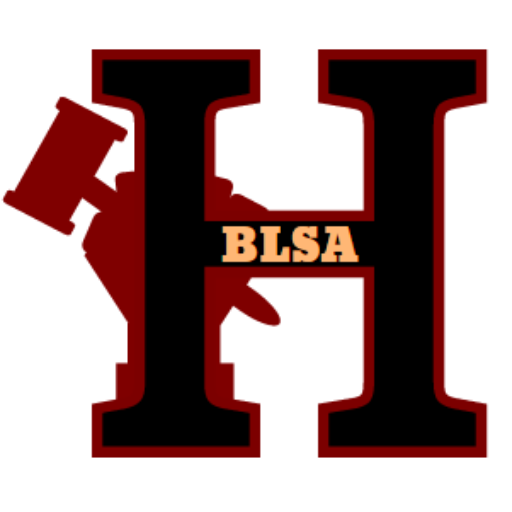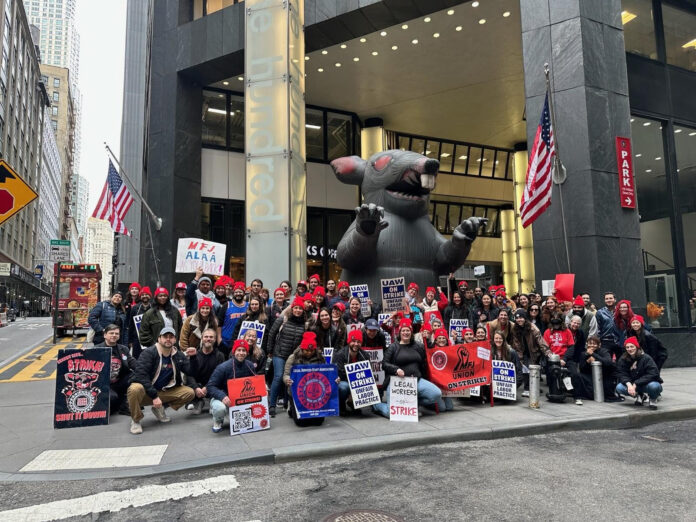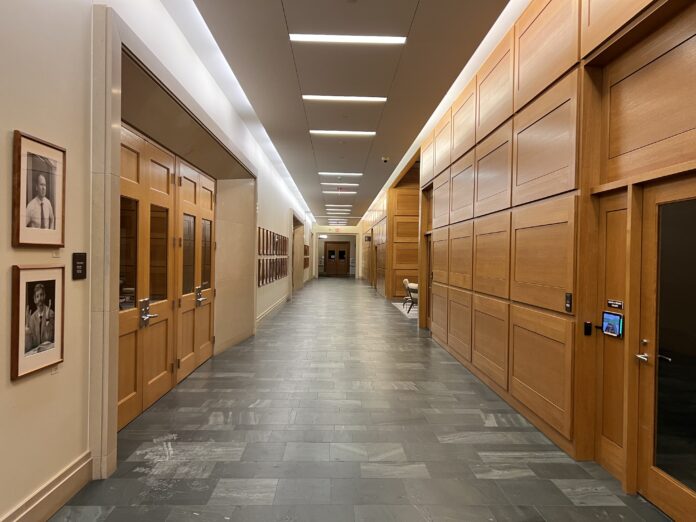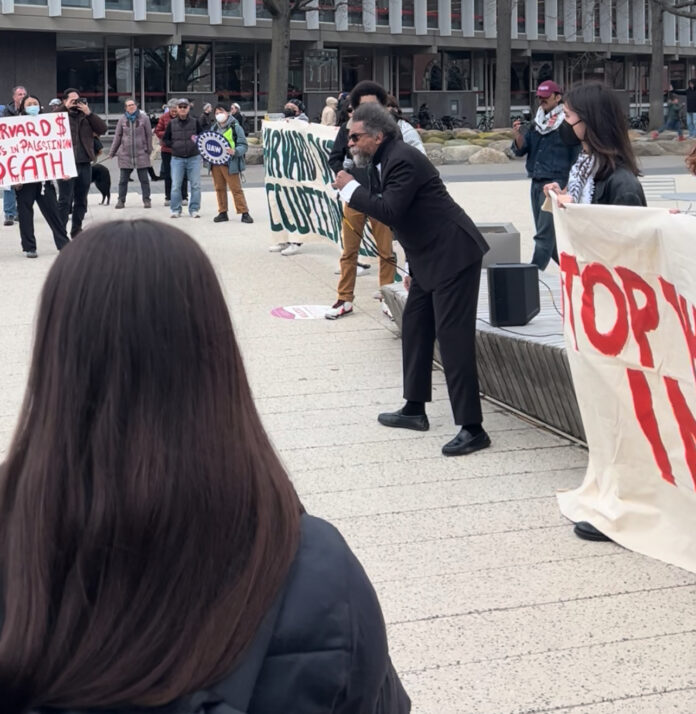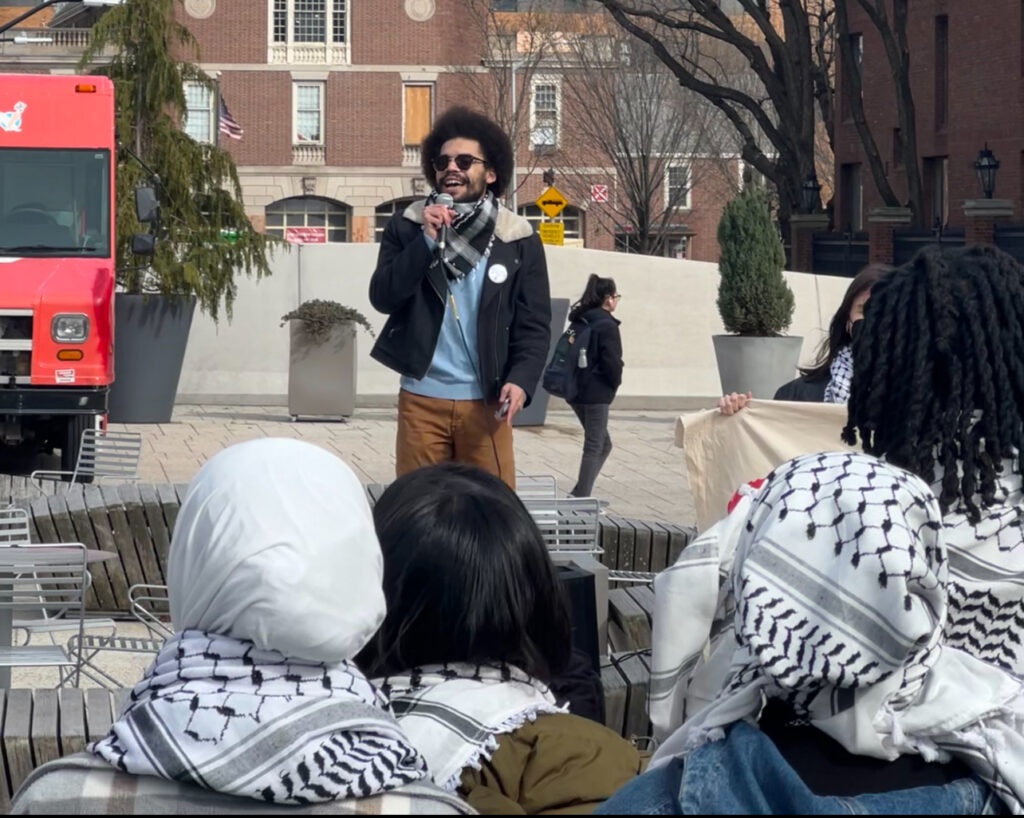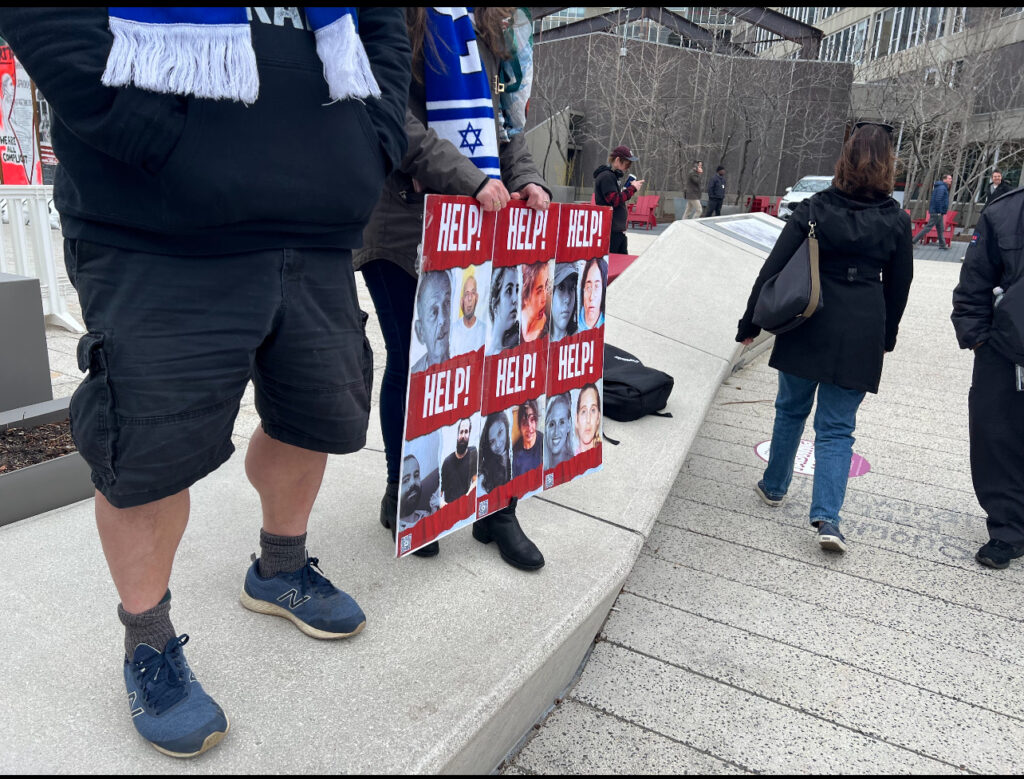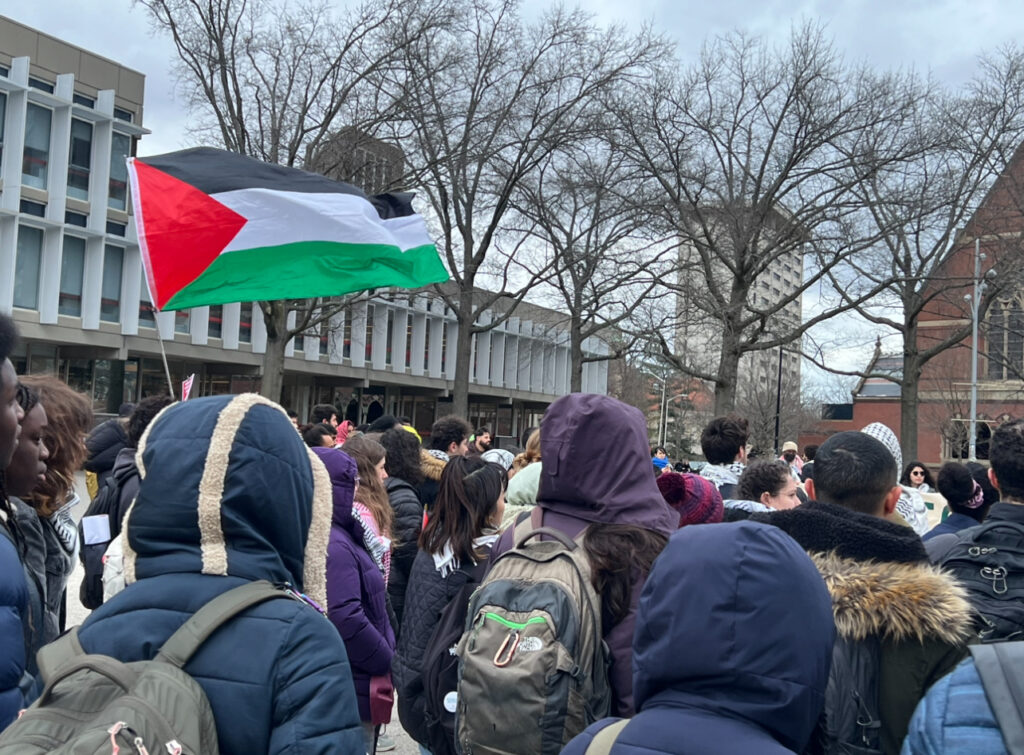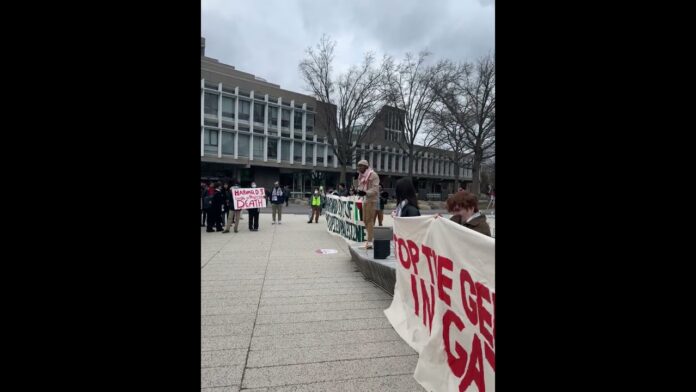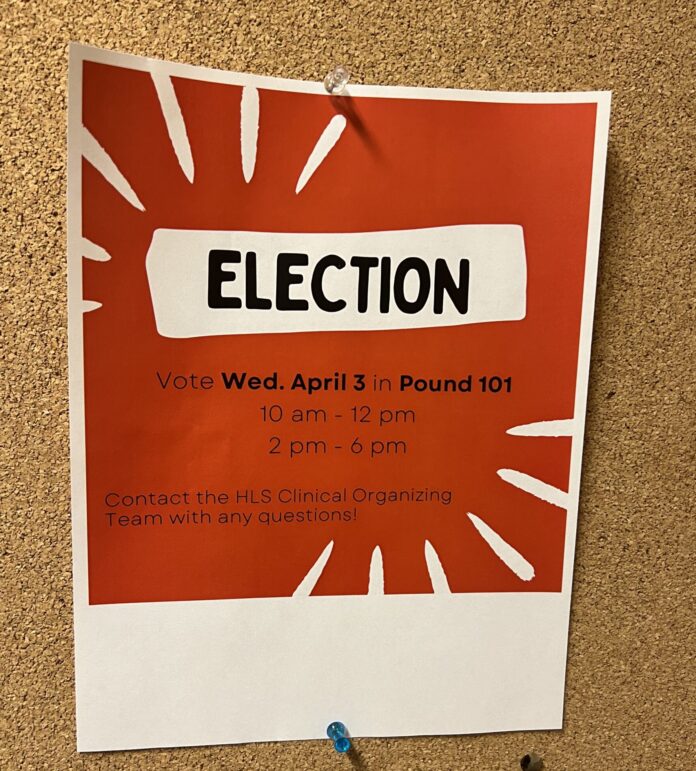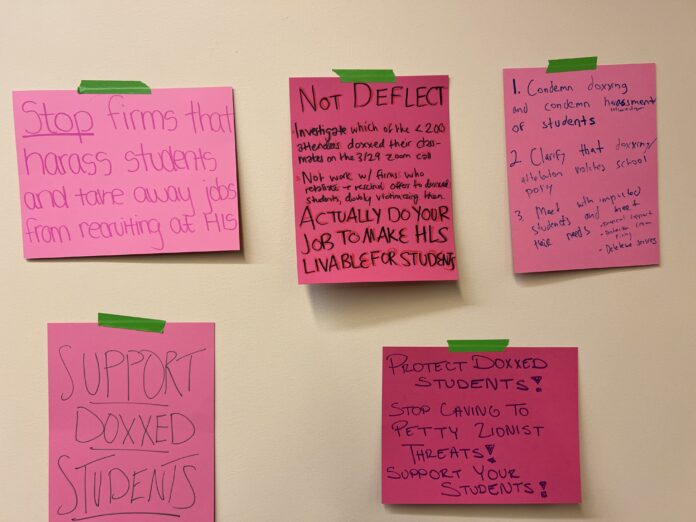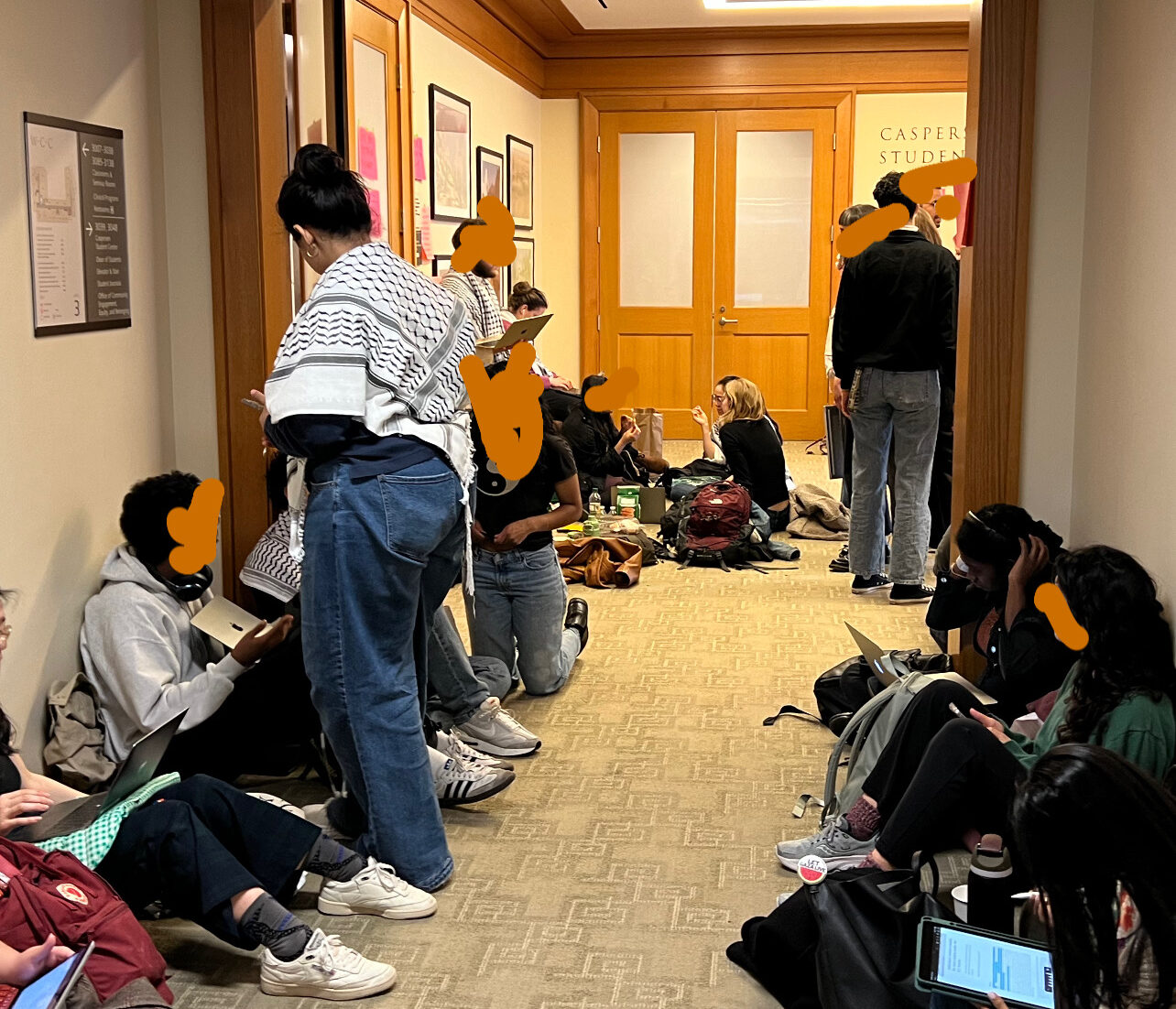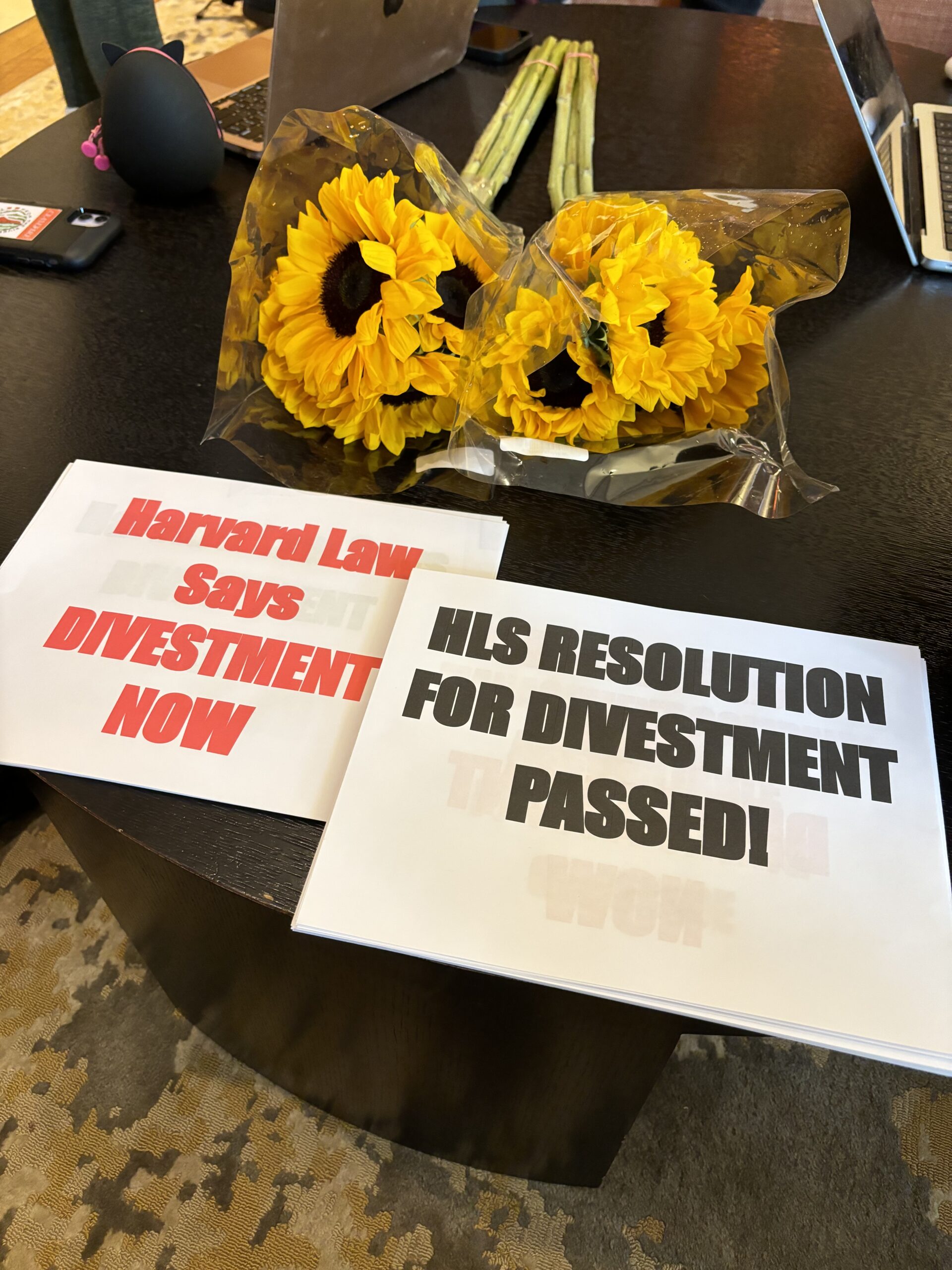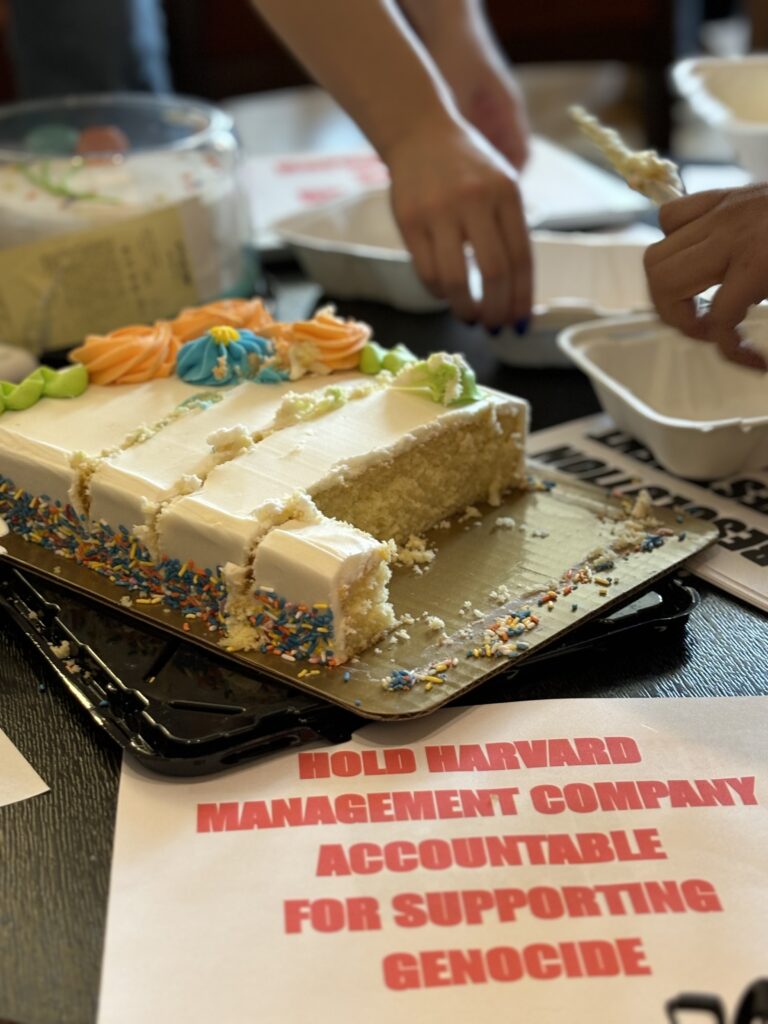Have a response to this collection of testimonials that you’d like to share? Letters to the editor are always welcome; send submissions to editor@hlrecord.org.
As the poet Mary Oliver wrote, “Tell me, what is it you plan to do/with your one wild and precious life?” I simply couldn’t imagine spending mine defending the often nefarious, usually boring, and never world-improving actions of corporations. – Liz Turner, JD ‘23
Despite what this institution would lead students to believe there are options for you that do not involve working for the least-deserving causes imaginable. EIP is not for your benefit, these organizations will use you, and the cost is the real-world harm you will perpetuate. I refused to participate in this institutional pipeline, and I would encourage you to think critically about who, and what, you want to lend your labor to. – Alex Brown, JD ‘23
abolish capitalism – anonymous
In the rarefied environment of HLS, EIP feels like the “safe” option that I might have – in a nearby alternate reality – turned to out of fear that my public interest aspirations wouldn’t work out. I do not have generational wealth to fall back on, and if I did, I would have gone to art school instead of this place. But part of my logic in choosing HLS was that this degree would enable me to choose a career that gives me fulfillment *and* gives society some sort of good while also paying me a regular salary. As HLS students, we already have a substantial safety net in that we will probably always be able to find a job to pay our bills. This safety net should inspire us to be brave and to reach for what we believe in, rather than to just reach for the next-highest safety net. Having said this, I acknowledge that different people have different family support obligations, and that for them the extra safety net maybe seems necessary in a way that it doesn’t to me. I have friends who did EIP, and they are still my friends. How can I judge them when I have, on so many occasions, asked myself whether I made a mistake by forgoing EIP? But the closer I get to graduation, the more I become grateful that I took what, at the time, felt like a risk in order to stay truer to myself. You have to remember that EIP is a safety net that comes with a lot of strings attached (whether explicit or implicit), and then ask yourself whether you’re really going to make the effort to untangle yourself from the web once you’ve ventured to get caught up in it. – Katie Super, JD ‘23
I chose not to do EIP because I care about making the world a better and fairer place. To that end, I came to law school to challenge corporate power/economic inequality and to struggle for labor rights and distributive justice.
Big law firms directly serve the interests of corporations and the rich at the expense of virtually every value and principle and aspiration held by progressive people (and anybody interested in building a better world)—things like economic justice, racial justice, criminal justice, environmental justice, etc. To work for a big law firm is, simply stated, to directly contribute to the perpetuation and extension of all the existing systems of oppression and inequity and exploitation and injustice operating in our society.
There exist plenty of legitimate and rewarding career paths that a progressive law student might pursue that challenge rather than contribute to inequality and injustice. Doing EIP is far from inevitable; it is, and always will be, a choice, and one that none of us has to make. – Jason Vazquez, JD ‘23
If you attend HLS, you’re handed Big Law on a silver platter. What you’re not told, with that offer, is the structural and systemic harm to which a career in Big Law actively contributes. I did not do EIP because I am committed to structural and systemic justice, and I want my post-graduate work to contribute to that goal. – Samantha Perri, JD ‘23
Quoting Nadia Ben-Youssef, Professor William P. Quigley once wrote, “Lawyers are either servants of the people or predators.” Choosing not to do EIP was a very easy decision. – Marisa Wright, JD ‘24
Eight years ago, I worked at a sweatshop where the supervisors would expect us to keep working with blood dripping off our hands. Virtually everyone there was an immigrant worker; most were making minimum wage even after working there for decades. As I organized a union with my coworkers, I had my first real experience fighting against injustice. Since I left that sweatshop, I told myself I’d never forget the horrors I experienced for only a brief period while working there—horrors that people around the world are subjected to day after day—and what it felt like to fight against them. I promised to the world that I would use whatever power and privilege I arrived at in this life to fight against the injustice that I experienced. Working in big law would mean perpetuating these injustices, consolidating even more power into the hands of corporations like the one that made me go home crying every day while I worked at its sweatshop eight years ago. – Tascha Shahriari-Parsa, JD ‘24
I was not interested in big law. I wanted to go to a smaller, family-friendly firm with a mixed portfolio of public service, government, and government-adjacent work, as well as some private client work. – Carlos Rosende, JD ‘23
I am committed to a career in environmental law and policy. – Shashank Vura, JD ‘24
As Harvard Law students, we owe it to our communities to reallocate the tremendous access and privilege engendered by being affiliated with this institution. – anonymous
I’m not interested in pursuing personal wealth at the direct and significant cost of so many others. – Ash Tomaszewski, JD ‘23
I did not do EIP because I do not believe that the practice of law is value-neutral. We are morally responsible for how we leverage the immense privilege and mobility that we gain through our affiliation with HLS. I did not do EIP because I do not want to profit off of the extraction of wealth from marginalized communities and the working class; I do not want to defend, buttress, and legitimize corporate law’s role in this process. – Alex Ropes, JD ‘23
Before law school, I worked in a high-paying, high-stress job analogous to big law and found it to be physically, mentally, and spiritually demoralizing. I was deeply unhappy on a day-to-day basis, and worse, ashamed of the impact of my work overall. I cannot go back to living that way. I feel so blessed to be able to firmly refuse from engaging in EIP and to be able to pursue more meaningful work. I admit that part of why I am able to firmly refuse is because I accumulated financial resources in my first job — but I also think the experience gave me perspective on both how much money I need to live and how the work I do impacts myself and those around me.
Above all, I resent Harvard Law School, the wealthiest educational institution in the world with an ever-increasing endowment, for creating structures that fuel big law and deepen wealth inequality. Shame on Harvard. Thank you to the dedicated group of students organizing for a more realistic and livable LIPP and for other structural changes that support PI and/or low-income students, including a return of third-year free tuition for PI students and 100% funded financial aid. – anonymous
I am not interested in private law. – Vinny Byju, JD ‘25
I came to law school hoping for a career in public service. I did not see EIP as the best use of my time in pursuing that goal. – Sebastian Miller, JD ‘24
Our time on Earth is short. I don’t want to spend multiple years of my life working 60-80 hour weeks in a career that provides me no fulfillment and makes the world a worse place. The big law salary is tempting, but for me, the joy I can find outside of big law is worth so much more. – Ethan Judd, JD ‘24
Big law is a prison of the mind and the soul. I am rejecting the industry out of self preservation. The good news is, there is so much more out there for all of us. – anonymous
EIP couldn’t give me a job that I think is fulfilling, purposeful, or in the business of building a better world. It couldn’t give me a workplace that values me, people, and the planet more than it values my grinding productivity protecting profits and power for the already rich and powerful. The money it offered couldn’t increase my quality of life without first stealing my happiness, work-life balance, and the opportunity to be of service in the communities I came to law school for. Nothing EIP had to offer was worth giving that up.
Still, it wasn’t easy or fun to delete daily EIP reminder emails from OCS and watch what felt like all of my classmates walk the gilded, well paved, well lit path to big law. My class was coming away from a fully remote school year when we made these choices, and I felt so alone because I had no idea how many of us had opted out. We didn’t have this poster. I hope we’re the last class who ever has to say that. – Malia Gesuale, JD ‘23
I am committed to the field of public defense, and fortunate enough that I do not feel immense financial pressure to go the big law route. I wish HLS gave all students enough financial support to have true freedom over their career choices. – anonymous
I didn’t come to law school to serve corporations. I came to law school to serve people. – Matthew Rock, JD ‘24
I believe there are other pathways that will leave me more fulfilled and happy than going through EIP. – anonymous
It was important to me to spend my summers experiencing different types of roles in government work to feel out possible career paths. Basically, I decided it was worth it to focus on the kind of work I came to law school hoping to go into, even though I made less money and didn’t come away from my summers with a law firm return offer like so many people do. I think I ended up getting more substantive work experience than I might’ve if I had found jobs through EIP, and I wouldn’t change anything if I had the chance to do it again. – Taylor Broadbent JD ‘23
I came to law school to fight capitalism, not perpetuate it! – John Fry, JD ‘25
I came to law school knowing I wanted to do public interest work. Lots of well-meaning people encouraged me to do EIP anyway, but I knew that I wanted to spend my time in law school getting as much experience with different kinds of public interest litigation as possible, so doing EIP just didn’t make sense for me. I have no regrets about my choice. – anonymous
I have the privilege of being at Harvard Law School, and I intend to use that privilege to combat and dismantle unjust and oppressive systems. Big law firms actively work to uphold those very systems and to cause harm to marginalized communities and the environment. I refuse to be complicit in that harm. – Emilie Montgomery, JD ‘23
I came to law school to make the world a better place— not to be a trained legal mercenary who protects corporate interests. I am also tremendously lucky to be from an upper middle class family and have no undergraduate debt. To enter big law is to betray the very morals that brought me to Harvard, and I am in a position where I can act on those morals. The actual numbers of HLS students who leave their firms for PI work are dismal, and I recognize that I would most likely be the rule, not the exception. I am still on track to pay my law school loans in a job that will at least help in dismantling the oppressive systems that hurt the communities I care deeply about. No matter what, my future career in plaintiffs’ law will far exceed the earnings of my own parents, who were able to provide me with every opportunity a child could want. The future may be uncertain, and to be honest, it can be a lonely and challenging road. But I remind myself that the road to Harvard was not an easy one. I remind myself of the supportive PI community at Harvard that inspires me to put service before self every day. I remind myself to strive to live authentically, to do no harm, and to be the kind of lawyer 6-year-old me would have been proud of. – anonymous
I want to pursue work on the issues I’m most passionate about! – Sabrina Ochoa, JD ‘24
I choose not to do EIP because working at a big law firm that uses the law to line the pockets of major corporations and further wealth inequality does not align with my values. As a first-generation college graduate, the opportunity to pursue a legal education is a tremendous privilege. For generations, my family has worked hard, laying the foundation for me to break down this barrier. I am committed to using this privilege to push the boundaries of the law ideally to make our society more just, and at a bare minimum not to perpetuate harm. Without a doubt, the pull to participate in EIP is strong—from the ease of securing a 2L summer and postgraduate job thanks to Harvard’s status as an elite institution, to the massive salary that would alleviate the burden of student loans and other financial hardships, to the entrenched institutional culture to conform. But the pull, and our collective obligation, to use the law ethically and responsibly is greater. – Rachel Landry, JD ‘23
I came to law school to work in the public interest, not to go to a firm and work against it. – anonymous
I think life is too short to work 80 hrs/wk for the man when we have shit to do (aka making this world livable for our kids)! – Lea Kayali, JD ‘24
I did not do EIP because the positions offered there were not the lawyer I wanted to be. I recognize that I am incredibly privileged in having what felt a real choice not to do EIP – I don’t share this to shame people who do the program and take Big Law jobs, I only share to encourage others to recognize when you truly do have a choice. Don’t let HLS tell you you need a Big Law job to get training or to be effective. You can be the effective advocate/lawyer/person you want to be right out of graduation, so don’t give up that precious opportunity. – anonymous
The brokenness of our legal system creates unfathomable harm and suffering. I do not want to join those breaking it to help the wealthy and powerful so that I can be wealthy or powerful. I want to be—I am—on the other side. – Tamara Shamir, JD ‘25
I didn’t come to law school to serve the interests of capital. – anonymous
I want to be part of just solutions, not pedantic defenses that serve corporate interests. – Aaron Nytes, JD ‘24
I came to law school to help people. I never want to become part of the corporate power structure that is a large part of the reason our system of law is so unjust. Corporate law firms cause so much harm and represent some really reprehensible clients, and if you work at a firm, you can’t opt out of that representation. Going to work in public interest, I know I can choose the representation I take on to make sure it fits with my vision of a more just world. Practicing law is not morally neutral–it can cause a lot of harm or do a lot of good. The choices we make now will have real effects in the world, and we should always be cognizant of that. – Samantha Nagler, JD ‘23
My entire motivation for coming to law school was to work on issues that matter to me in the public interest sphere – namely housing, education, and civil rights. Without this interest, I simply wouldn’t be in law school – I’d be earning a salary somewhere else! It is important for my own success (and survival) here that I remain grounded in my purpose and what brought me to HLS. – Sarah Berton, JD ‘25
I want to use my legal education to help people that need it, not corporations that don’t. – anonymous
I came to law school to use my power and privilege to work on behalf of and alongside currently and formerly incarcerated individuals. Even though I am first-gen and don’t come from a wealthy background, I always knew that using my law degree to advance justice was far more important to me than money or prestige. Big law causes real harm to our communities and it would be against my values to participate! I am so excited to work in legal aid and help people access housing, employment, and licenses after incarceration! – Lexi Gray, JD ‘23
Like so many of us, I applied to law school because I was excited about the power of the law as a tool to make the world a more just and equitable place. Sometimes the day-to-day of law school and financial and social pressures can make that belief seem naive, idealistic, and plain wrong. But, with the help of the public interest community at HLS (students, advisors, and alumni), I’m able to remember why I’m here. An HLS education is an incredibly powerful tool for social justice and we should all feel empowered to use our degrees accordingly. – Joelle Boxer, JD ‘24




